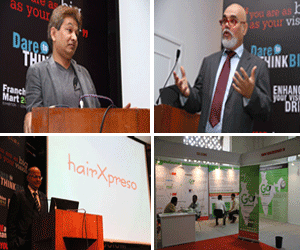Ashish Garg’s vision is to make labeled clothes affordable for everyone. With Promart, Garg is taking fashionable clothes to the semi-urban towns of India.
There is no doubt that India, in global market, is seen as a flattering investment zone by many marketers, of which majority are targeting the big cities due to the pace of development. With many eminent brands spreading their wings across these burgeoning metropolitan cities, lifestyles of people has surely got uplift.
The trend of fashionable clothes labeled with brands has also shot up the price tags, making it difficult for a commoner to aspire for the labels. Keeping that in mind, the concept of Promart was conceived in the year 2008, under the famous retail brand, Provogue India, later taken over by Apple Group of companies and VEMB Lifestyle Pvt Ltd. The idea was to bring fashionable garments to those who has aspired for it but could not afford and would have loved if the same was available on discounts.
Ashish Garg, Managing Director, Promart, tells about the background of his recently acquired company, “Earlier, Promart was the retail concept under the brand Provogue, and later in 2011 it was bought by Promart. It is basically a concept of selling products of different brands under discounts of 25- 60 percent. It is a multi-brand store, where fashionable products are available to the people at cheap prices, which are otherwise sold in big stores at expensive rates. The concept is build for those groups of people for whom fashion is unaffordable.”
The basic idea of the company is to offer branded apparels to people with discounts up to 60 percent, making fashion an easy purchase for the people residing in smaller towns. According to Garg, Promart makes business sense despite the heavy discounts.
“No, the margins are not impacted because we are buying throughout the year. In that way we are having mark-up which leave sufficient margins on the products, which we are passing on to our customers,” says Garg.
Promart is mostly spread across the tier 2 and 3 cities i.e. the smaller towns of India. The dedication of idea is all about making consumers familiar with the trendy outlooks. Moreover, the retail chain is not eccentric to youth or women; it is a place which caters to general masses with economical ranges. For Garg the idea is to make people of smaller areas approachable to the fashion, which they feel, is not in their budgets.
“Our target is not to focus on the metropolitan cities or specifically the big cities or malls of Delhi, Mumbai or Kolkata. We are concerned to make Promart as a neighborhood store. We are targeting those people who come under the major section of this country i.e. the decent-earning class. We do not want our store to be like high-end fashion stores where people feel scared to enter with the feeling that their pockets will not be able to afford it. Here at Promart, a common man can come and purchase whatever they want and the location is made with total considerations of common man’s sensibilities,” says Garg.
For example Garg’s target in Delhi is to open in places such as Dwarka, where he already has a store, and somewhere in Sarojini Nagar or Lajpat Nagar. Garg says he is not looking to open stores in areas such as Saket, Vasant Kunj or South Extension because people with limited budget in mind are not able to buy stuff at these places due to higher costs and unfamiliar environment.
“The core point lies in the affordability, not the purchasing power. A Levi’s jeans, which is available in the market for Rs. 2200 or Rs. 2500, we are selling at Rs. 1200.” He also leveled that the quality is not compromised with the price, as products are directly imported from the company.
On warehousing and distribution strategy, Garg says Promart is working on no-warehousing concept. “We work on zero-inventory level. Our target is to bring in inventory in the stores on all seasons and finish it off by the end of quarter or half year,” says Garg.
Franchise, a lucrative model
Since the time Promart has separated its ways from Provogue, the company
has opened up three franchisee stores in India, though it is looking ahead to expand more via the franchise route in near future.
“Franchising is something via which we have started to expand our network. We already have three franchise running stores in Jodhpur, Nadiad and Jhunjhunu ,” says Garg.
Currently Promart is running 29 company-owned stores, and the plans are to take the number to 54 by December-end.
“Franchising is a lucrative model and we are now focusing on this model for growth. Once we complete our target of setting up company-owned stores, we will then be focusing majorly on franchise route, as the company is new in the market,” says Garg.
Future forecast
“Promart was the brand of Provogue in 2008 and for some reason they could not run the show, so we purchased it from them in the year 2011. After that we opened the first Promart outlet in Ahmedabad in November 2011, which is then followed by two stores at Baroda, Rajkot, Vapi, Mumbai, Aurangabad, Anand, Jodhpur and Indore,” says Garg.
With this, the company recorded revenues of Rs. 70 crore, with the margin profit of around Rs. 2 crore.
Garg says the target for the company is to reach Rs. 450 crore once both the company owned and franchise stores become operational.
Garg is optimistic about the potential growth of retail industry. “Retail sector is actually India’s future but how you manage and organize matters the most. The real challenge would be on the inventory side. As far as our retail venture is concerned, we are at a growing stage; we are hoping to achieve the target,” says Garg.
Promart’s strategy for the future is not to fight for the brand’s name in the cities such as Delhi or Mumbai. The real focus as Garg says is on the semi-urban and rural section of India and towns and cities with lower real estate cost. Besides this, franchise is going to be one of the major expansion plans for Promart.































 +91 9909960054
+91 9909960054